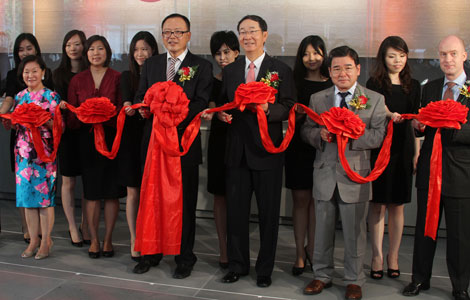Giving voice to voiceless people
Updated: 2014-07-03 12:17
By Jack Freifelder in New York (China Daily USA)
|
||||||||
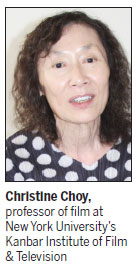
When most people think of filmmaking today, their images may include high-speed car chases, multi-million dollar explosions and other attention-grabbing special effects.
But cinematographer Christine Choy eschews all of that for her documentary filmmaking.
"I came from a rather peculiar background," Choy said in an interview with China Daily. "I was born in China, but I was always interested since the beginning to give a voice to voiceless people both in America and abroad - especially minorities, women and Asian Americans in general."
Choy, who was born in Shanghai around the time of the "cultural revolution" (1967-77), is a professor of film at New York University's Kanbar Institute of Film & Television in downtown Manhattan.
She has also served as the chair of NYU's graduate film program, the first Asian faculty member to hold the position, from 1994 to 1998 and again from 2002 to 2005. She is now in her 26th year at NYU.
As a child, Choy bounced around the East-Asia region, spending time in Hong Kong, Japan and South Korea before settling in the United States at age 14.
"The influence of so many different ideologies and divisions of modern Asia at such an early age was part of the reason I was sensitive in relationships with people who did not have a voice," she said. "Especially, for instance, Chinese people living in Korea or Koreans living in Japan, etc."
"Because I went through so many 'isms' prior to age 14, that helped engrain me in terms of looking at life and making documentary film," she said. "No 1, I don't prejudge people."
Choy said that her childhood experiences en route to the US drew her toward visual storytelling.
"Due to [my experiences], I realized that I should do something to give a voice to those who don't have one," she said. "Unfortunately, I didn't have any guidance."
Choy's introduction to cinematographic work would not begin until she reached her collegiate years.
She received undergraduate and graduate degrees in architecture from Washington University in St Louis and Princeton University, respectively, before attending Columbia University in New York where she earned a degree in urban planning.
As for why she didn't go into architecture, Choy said: "You are really at the mercy of your clients, and you really do not have much control in terms of what you create."
"At that time, most foreign students were older - most were in graduate school - so they came here to study toward law, engineering, medical or business degrees," Choy said. "Zero in literature, and that influenced me."
Choy got her start in filmmaking with Newsreel, a New York-based activist filmmaking collective.
A few years after joining, Choy helped rename the group Third World Newsreel (TWN) and refocused its efforts on helping serve international communities and diversify its pool of documentarians.
TWN is the oldest media-arts organization in the US devoted to cultural workers of color, according to TWN data.
Choy's body of work dates back to the mid-1970s and includes films on a bevy of China-related topics, like rural education and illiteracy issues, civil rights and immigration.
She said a film from her days with TWN about Chinese immigration, titled From Spikes to Spindles (1976), helped make her more aware of how Asians are portrayed in mass media.
"When I did research at the public library, there was nothing about Chinese," she said. "That began to raise my curiosity and because I was the only female with an Asian background making films, it was quite easy for me to garnish a lot of grants. Films that deal with women in prison, battered women, etc."
A 1982-83 work, Mississippi Triangle, that explored the ethnic relations among Caucasians, Chinese and African Americans in the Mississippi Delta region, drew the ire of some local residents.
"I didn't realize there were Chinese people in Mississippi [at the time]," she said. "Fortunately there was one last woman who was half Chinese and half black, so I interviewed her. However, the other Chinese in the community were furious because they thought she did not represent Chinese people."
One of Choy's most well known projects is the Academy Award-nominated documentary from 1988-89, Who Killed Vincent Chin.
On a June night in the summer of 1982, two men in Detroit killed a young Chinese-American engineer named Vincent Chin.
Both men were convicted of manslaughter after a plea bargain brought the charges down from second-degree murder. Although they confessed, each was given three years' probation, fined $3,000 and ordered to pay court fees, but neither spent a day in jail.
In the film, Choy and co-director Renee Tajima delve into the implications of the beating that ultimately killed Chin and the repercussions for the families involved in the case.
A June 2012 piece in the Detroit News, around the time of the 30th anniversary of the incident, said the attack on Vincent Chin "sparked a civil rights movement that galvanized Asian-Americans across the country."
Choy said the "most important thing" she tried to address in the film was institutional racism.
"I was determined to make this film not only with that in mind, but also with the hope of a thorough investigation of what actually happened."
Choy said an important result of the Chin case was that Asian Americans, especially Chinese Americans, “woke up”.
Who Killed Vincent Chin, which made Choy the first director of Chinese descent to receive an Oscar nomination (Best Feature Documentary; 1989), encouraged her interest in working on films about dynamics among Chinese and other Asian groups, she said.
Choy visited North Korea and South Korea as part of the filming process for Homes Apart: The Two Koreas (1991), a 60-minutes documentary on the reunion of Korean families separated during the Korean War.
“My relationship with North Korea is quite cordial,” said Choy, who speaks Korean, as well as Chinese and English.
And the independent filmmaker probed the killing of Japanese foreign exchange student Yoshihiro Hattori in The Shot Heard Round the World (1996-97). She has also directed projects in the African nations of Ghana and Namibia.
Choy said she participates in a number of Asian-American events when she has time outside of teaching and extracurricular activities.
A round table discussion she moderated in March between Chinese director Zhang Yimou and Taiwan-born Academy Award-winning filmmaker Ang Lee drew about 1,000 people to the event.
“That was a fantastic experience and the students and people in the community gained a great deal,” she said. “It’s amazing that more and more people are interested in film, and Ang Lee gave incredible encouragement for parents who think the media is important.”
Choy estimated that she has made somewhere between 70 and 80 films, but she's "never even really bothered to count".
"When I grew up, we always saw a huge poster of Gong Non Bing - the workers, the farmers and soldiers - who are the most important people in your life," Choy said. "Now people are more into money making. I am not interested in money or fame."
Choy said she hoped her work can be used as a frame of reference for the experience of Chinese Americans in the US.
"My early education in China had a lot to do with that," she said.
"You think about the big picture rather than yourself. It's ingrained in me and was very important for me to do something for a larger cause. My philosophy is do what you really enjoy, and I enjoy what I'm doing. That's all I care about."
jackfreifelder@chinadailyusa.com
(China Daily USA 07/03/2014 page2)
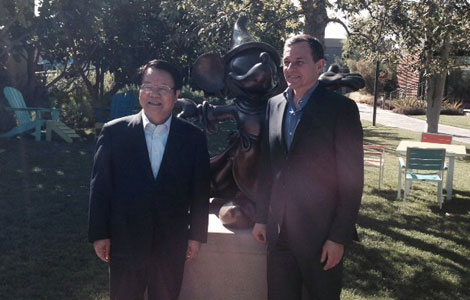
 China's Cultural Minister visits California
China's Cultural Minister visits California
 Macy's 'Fourth' show will include made-in-China fireworks
Macy's 'Fourth' show will include made-in-China fireworks
 Spotlight on Chinese culture at DC Folklife Festival
Spotlight on Chinese culture at DC Folklife Festival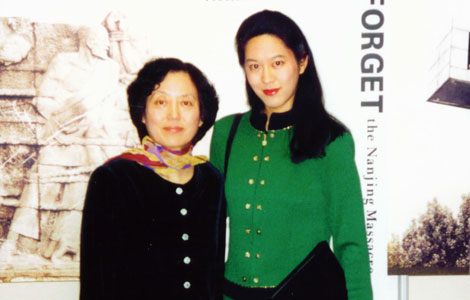
 Fulfilling a daughter's dream
Fulfilling a daughter's dream
 All-embracing school of combat
All-embracing school of combat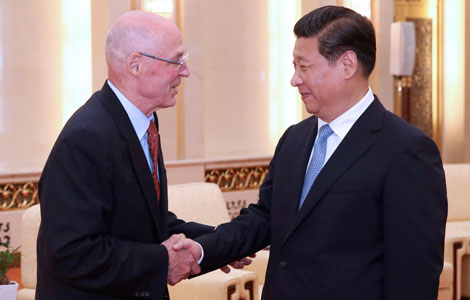
 Xi urges US to view China 'objectively'
Xi urges US to view China 'objectively'
 Xbox One readies for national debut
Xbox One readies for national debut
 Political plan
Political plan
Most Viewed
Editor's Picks

|

|

|

|

|

|
Today's Top News
ROK FTA expected this year
Chinese national arrested for alleged trade secret theft
Symantec off the list for all PSB offices
Chinese tourists celebrate the 4th, by shopping
Chinese tourists celebrate the 4th, by shopping
Feed additives at play in US-China beef trade
Chinese national arrested for alleged trade secret theft
Private, foreign investment to aid tourism industry
US Weekly

|

|

